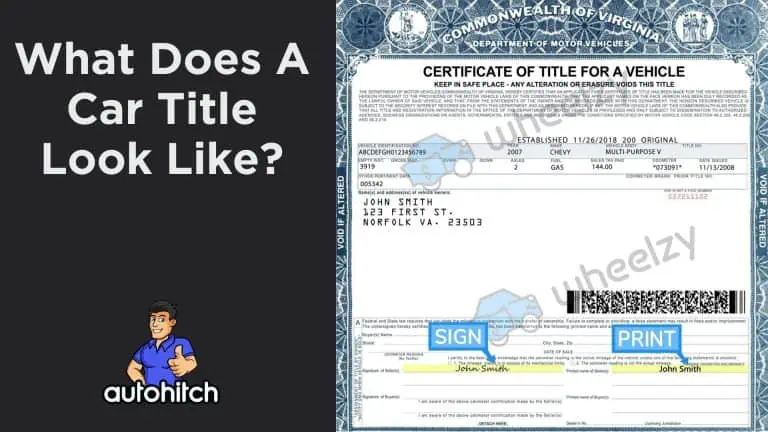What Does A Car Title Look Like
Although the design and layout of car titles can differ from state to state, most titles share some common features. They usually have the seal of the issuing state and display the following information:
- Vehicle Identification Number (VIN)
- Make, model, and year of the car
- Color of the car
- Owner’s name and address
- Title issue date
- Odometer reading at the time of sale
- Lienholder information, if the car is being financed
Car Title Example:
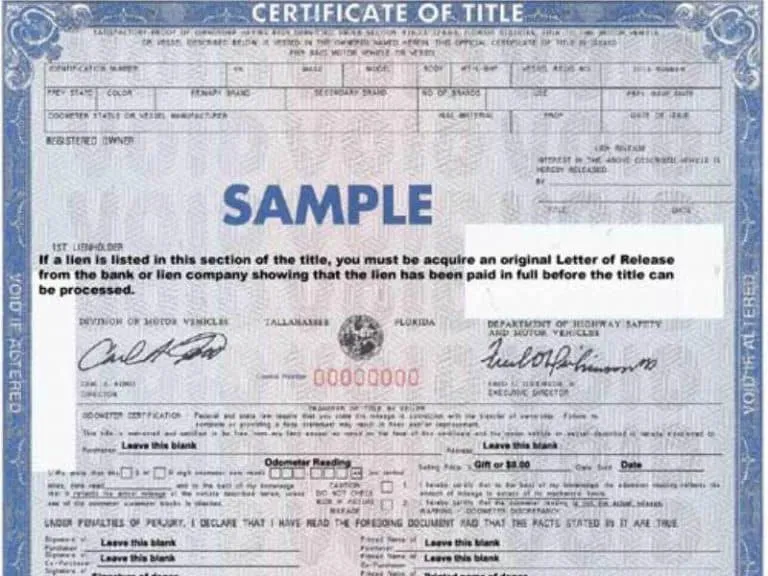
Key Takeaways: Essentials of Car Titles
- Purpose of a Car Title: A car title is a vital legal document proving vehicle ownership, necessary for transferring ownership during buying or selling.
- Types of Vehicle Titles: Titles vary, indicating a vehicle’s history and status, such as clean, salvage, rebuilt, flood, junk, lien, and branded titles.
- Role in Vehicle Transactions: Essential for legal vehicle transactions, the car title transfer process involves specific forms and procedures, varying by state.
- Handling Special Cases: In joint ownership, title transfer depends on the conjunction used (“and” or “or”). Transferring to a family member often has tax benefits and requires distinct steps.
Related Articles To Read About Car Titles:
- What Does a Car Registration Look Like?
- Car Title vs. Registration – What’s the Difference?
- How to Fix Written Mistake On Car Title When Selling
- How To Sign Over A Car Title
- What Is Title Jumping and How to Avoid It?
- What Is an Open Title on a Used Car
- How To Find The Title Number For Car
Table of Contents
What Is a Car Title
A Car title is essentially the document that proves you own a vehicle and looks a lot like any typical government document related to ownership, such as the deed to a house or even a business license.
Not only is the title to your car the evidence that you are its legal and rightful owner, but it is also the same document you need to transfer ownership to another individual or even an entity when buying or selling a car.
For a reference and sample of each of the 50 states’ car titles and what they look like, head over to this link (Car Title Example Images)
Types of Vehicle Titles and Their Meanings
| Title Type | Definition | Key Points |
|---|---|---|
| Clean Title | Indicates a vehicle that has never been declared a total loss by an insurance company. | – Desirable for resale – No significant past damage – No liens or major issues |
| Salvage Title | Given to vehicles considered a total loss by insurance due to extensive damage. | – Requires extensive repairs – May not be safe or insurable – Lower resale value |
| Rebuilt Title | Assigned to a vehicle after being repaired from a salvage title status and passing a safety inspection. | – Can be insured and driven – Potential for undisclosed issues – Heavily discounted prices |
| Flood Title | Given to cars that have been severely damaged by water immersion. | – Can lead to long-lasting damage – Often difficult to insure |
| Junk Title | Indicates a vehicle that is non-repairable and only valuable for parts. | – Cannot be driven legally – Sold for scrap or parts only |
| Lien Title | Indicates that there is an outstanding loan or debt on the vehicle. | – Owner cannot sell until lien is resolved – Must be cleared for a clean title |
| Branded Title | General term for a title on a vehicle that suffered catastrophic distress, like flood or total loss. | – Includes salvage, rebuilt, and other damage-specific titles – Indicative of a car’s troubled history |
Expert Tip: When you buy a car, the title will obviously not be in your name until you go to the DMV. During this period, the Bill Of Sale is your proof of ownership. This is important should you buy a car with a jumped title.
How Much Does It Cost To Transfer A Title?
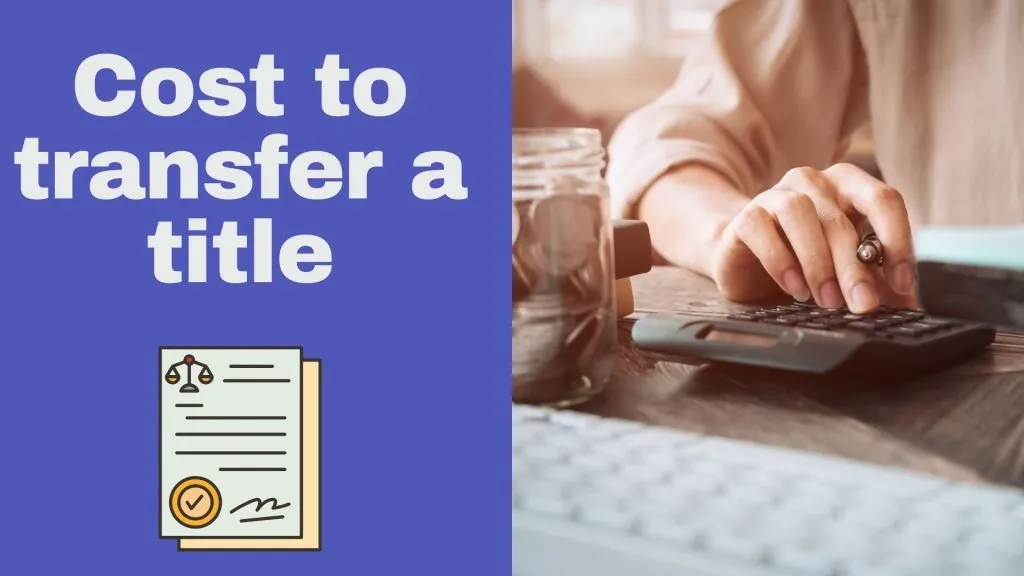
Every state has its own fee structure, but here in Florida, the cost to transfer a title is $75.25 for vehicles and mobile homes and only $5.75 to transfer titles for a boat.
That’s probably the only time anything with a boat is cheaper!
For your state’s fees, simply head over to DMV.org or Google “Your State” DMV, and there, you can find the relevant section for any and all fees. It’s probably going to be easy to find as it’s the topic most people are concerned with.
How To Transfer A Car Title
Again, I can’t speak for every state, as many states can have more or fewer forms or processes, but in Florida, you must fill out an HSMV Form 82040 (PDF Form) and take this form to your local tax collectors office for processing.
In Florida, car buyers and sellers should be aware that there are now satellite offices (County Tax Collector-Sponsored Service Centers) operated by private companies that can handle these types of transfers but be aware:
Anything complicated or with extenuating circumstances, like fouled-up forms or missing documents, must be handled at the Tax Collectors Office where they have the proper authority to make changes and decisions.
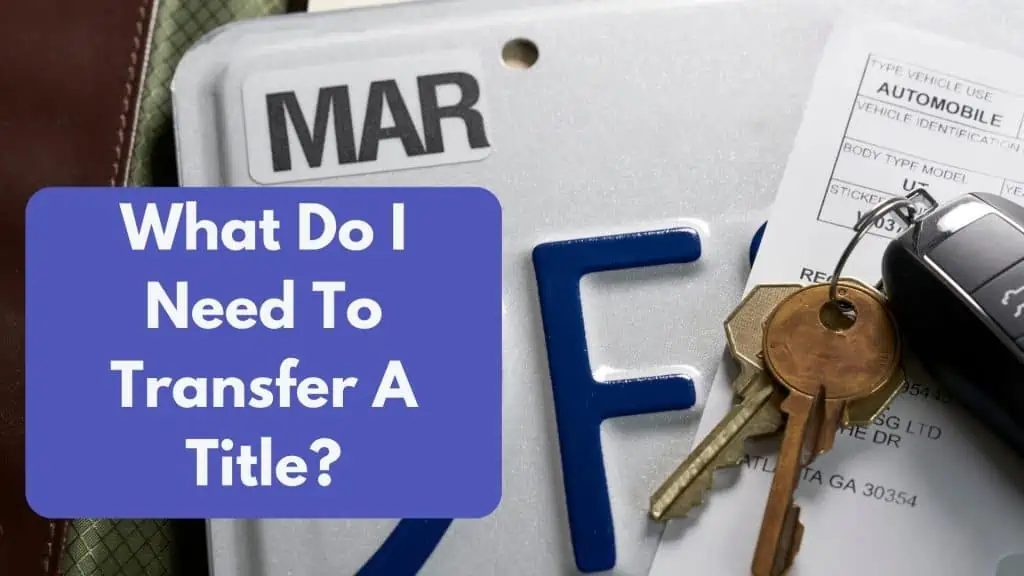
What Do I Need To Transfer A Title
This question actually varies more than most, but generally, the most basic documents you will need are:
- The title of the vehicle was signed and completed by both the buyer and the seller
- A completed Bill Of Sale (Here is a sample Bill Of Sale in PDF Format you can use for a car sale)
- Your states form for application for title (Here in Florida, it is Form 82040)
- Photo I.D.
From here, some states, such as California, require smog or emissions forms and even proof of insurance.
The proof of insurance isn’t usually necessary for simply transferring a title, but in some states, it actually is, and you should check before heading into the DMV, or you will be turned away!
Some state websites can be confusing, however, because a vast majority of title transfers also involve registration work, which ALWAYS requires proof of insurance, so they may be listed as something to bring but are not actually a requirement.
If you can’t narrow down your state’s requirements, just leave me a comment below, and I will check it out for you.
Transferring a Car Title with a Lien
If you’re planning to sell a car that still has a lien on it, you should understand first that selling a car with a lien is illegal if you have not first fully disclosed (preferably in writing) the existence of said lien to the buyer.
Secondly, if you do sell a car with a lien on it, you will not be able to actually transfer the title until the lienholder has released the lien with the state.
The lien holder accepting payment and giving you a receipt is not a release!
You must ensure that the lien holder contacts the state, either directly or electronically, and releases the lien for any title to be transferrable.
How Much Is The Penalty For Late Title Transfer?
Each state will have its own deadlines and fees, but here in Florida, if you do not complete your transfer within 30 days, there will be a $20.00 late fee at the time of transfer.
Can You Transfer The Title Of A Car Online
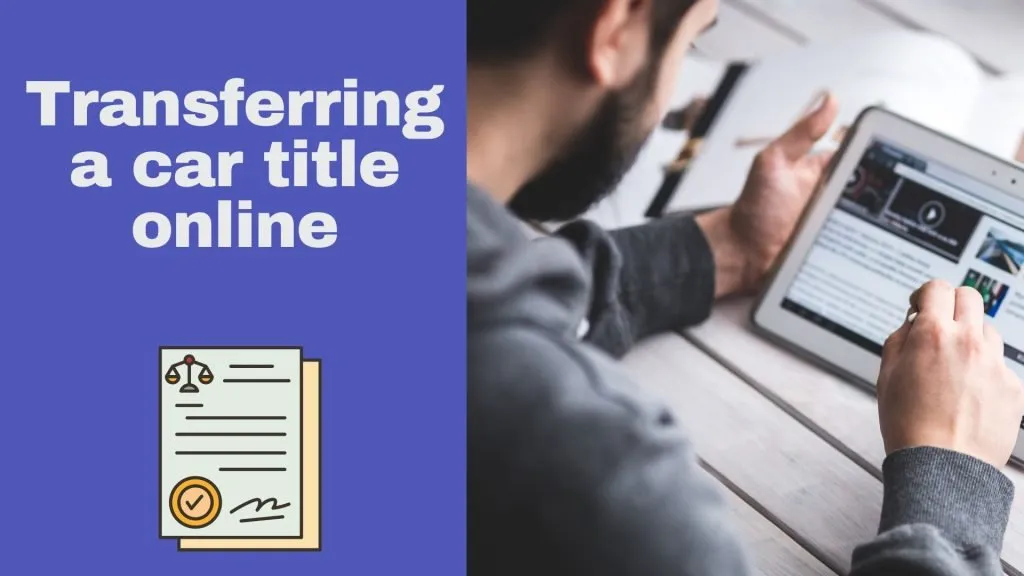
As of 2023, the answer is no; there aren’t any states that currently allow for the transfer of a car’s title online.
Will this be coming in the near future? Not likely, at least for individuals. The reason is obvious, really- Fraud.
Fraud has always been a big problem in the private seller market and likely always will be,
so the idea of titles transferring online without someone physically verifying any of the information just doesn’t seem very wise.
How To Get A Title For A Car With No Title
There are two reasons people typically need to get a title where none exists:
- You lost your vehicle’s title
- You purchased a car with no title
What To Do If You Lost Your Car’s Title
If you lost your title, all you need to do is apply for a duplicate title.
See our article on how to get a copy of your title fast for the full process.
You should be aware that once you do this, your previous title is no good.
So if you find it, shred it immediately. I emphasize this because people have applied for a duplicate only to find their original later and confuse which is which.
Can You Add Someone To The Title Of A Car?
Yes, if, for whatever reason, someone decides they wish to give equal ownership of a vehicle to another person, they can legally add them to the title, BUT BE CAREFUL.
Joining the names with “Or” means that either person could sell the car in the future, but using “And” means that both parties would have to be present to sign off on a sale. A perfect example of when you might want to use this difference is if you are helping a son or daughter buy their first car at a young age.
As a sort of investor parent, you wouldn’t want your child to be able to run off and sell that car without your approval.
Buying A Car Without A Title
Let’s say you buy a car, and for whatever reason, you didn’t get the title at the time you made your purchase. After some time goes by, it becomes apparent that you simply aren’t getting or finding a title; you’re stuck, right? Not exactly. If the reason you didn’t get a title was that the vehicle you purchased was legally declared:
- Abandoned
- Junked
- Stolen
Then no, there isn’t much you can do to get a title in your name. However, if your purchase falls outside of these circumstances, then there is something you can get, it’s called a Title Bond (Also known as a Bonded Title), and to get it, you will need a Surety Bond.
What is a Surety Bond?
Well, a surety bond is a legal instrument that makes you financially responsible for the vehicle, something you need as you can’t legally prove you own the car. If you are reading this and need to know where to pick up such a bond, you can use this link here (Surety Bond Provider), which is a company I found on DMV.org, so it should be pretty reputable.
Don’t worry; these bonds are not very expensive.
Be Advised: If someone comes forward with a rightful claim to the vehicle, the surety company will pay this person a fair amount for the vehicle, an amount that you will then have to pay back to the surety company. So, no, they won’t take the car from you, but you could end up paying for it twice.
Conclusion
Car titles are certainly not cut and dry, but I do hope I was able to answer one, some, or hopefully all of your questions. However, if I didn’t, I would love for you to leave it in the comment section below.
This will not only help me better assist you, but it may very well be something that helps car buyers and sellers for years to come!
Thank you again for choosing to be a more informed car buyer, and I look forward to seeing you in other posts and potentially working with you via our Autohitch Car Buying Program!

